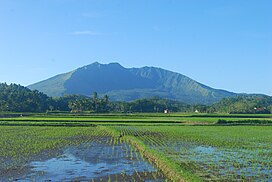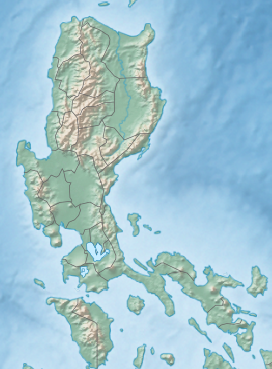Mount Iriga
Appearance
| Mount Iriga | |
|---|---|
| Mount Asog | |
 | |
| Highest point | |
| Elevation | 1,196 m (3,924 ft)[1] |
| Prominence | 1,009 m (3,310 ft) |
| Listing | Active volcanoes in the Philippines |
| Coordinates | 13°27′24″N 123°27′24″E / 13.45667°N 123.45667°E[1] |
| Geography | |
 | |
| Country | Philippines |
| Region | Bicol Region |
| Province | Camarines Sur |
| City/municipality | |
| Geology | |
| Rock age | Quaternary |
| Mountain type | Stratovolcano |
| Volcanic arc/belt | Bicol Volcanic Chain |
| Last eruption | 1642 |
Mount Iriga, also known as Mount Asog, is an active stratovolcano in the province of Camarines Sur, in the Philippines.
It is a stratovolcano about a kilometer from Lake Buhi. It rises 1,196 m (3,924 ft) with a base diameter of 10 kilometres (6.2 mi).[1][2] It has a large crater formed due to a debris avalanche.
Mount Iriga, generally known for its phreatic explosions, erupted in 1628 and 1642.[2] After these eruptions, it remained dormant.
Gallery
[edit]-
View from San Ramon, Iriga
-
View from San Jose, Iriga
-
View from Perpetual Help, Iriga
-
View from Iriga Central Terminal
See also
[edit]References
[edit]- ^ a b c "Iriga". Global Volcanism Program. Smithsonian Institution. Retrieved September 17, 2011.
- ^ a b "Mount Iriga". Philippine Institute of Volcanology and Seismology (PHIVOLCS). Archived from the original on September 1, 2011. Retrieved September 17, 2011.
External links
[edit] Media related to Mount Iriga at Wikimedia Commons
Media related to Mount Iriga at Wikimedia Commons






